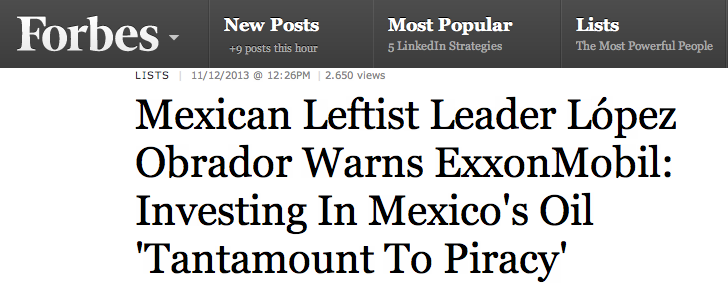Entrevista de Andrés Manuel López Obrador, presidente del Consejo Nacional del Movimiento Regeneración Nacional (MORENA), en Forbes.
Mexican leftist leader Andrés Manuel López Obrador has a message to foreign oil tycoons: investing in Mexico’s oil industry “would be like buying goods without a receipt, something crooked, tantamount to piracy.” In a letter toExxonMobil ( NYSE: XOM) CEO Rex W. Tillerson, the two-time Presidential candidate warned that the Mexican Constitution prohibits the participation of private companies in the oil industry.
“We are informing Mr. Tillerson that the oil does not belong to President Enrique Peña Nieto, nor to the government, not even to the State, but rather to the people of Mexico,” López Obrador said in a telephone interview from Mexico City.
In the letter he tells Tillerson “to take into account the consequences of establishing business relations with a government that wants to violate the basic and spiritual principles of the Mexican Constitution.” Similar letters are being sent sent to Chevron, Shell, Total, Spain’s Repsol and Brazil’s Petrobras, López Obrador told me.
Asked what he thinks Tillerson’s response will be, López Obrador said: “That depends on what they end up deciding. What we are doing is complying with our duty of telling them that if the reform goes through, it will not be easy for foreign oil companies to operate in Mexico if they are perceived as accomplices of an assault against our national interests.”
He pledged to continue mobilizing his millions of followers in rallies and street protests.
López Obrador, a charismatic political figure who had an 84% approval rating when he resigned as Mayor of Mexico City to run for President in 2005 , said that while the U.S. tends to “downplay” countries’ internal opposition –like in Iran in the 1980s– he hopes this time around Americans understand the potential fall-out of “privatizing” the oil. “Thanks to the oil, Mexico has had political stability and internal peace. This has allowed Mexico and the U.S. to develop a harmonious relationship,” López Obrador said. Peña Nieto has denied the oil will be privatized.
Diana Negroponte, a nonresident senior fellow at Brookings Institution, said that the Mexican government “seeks to avoid, to the maximum, further energy reform street protests. These could endure for years well after passage of the law.” In an e-mail, Negroponte told me that the introduction of the secondary legislation in 2014, following approval of the bill, “provides the government with enough time to educate Mexican citizens about the content and implications of the reform.”
In 2006, López Obrador lost the presidential election by the razor-thin margin of 0.56%. His supporters never recognized his defeat and claimed that the Presidency was stolen from him. He ran again in 2012, an election won by Peña Nieto with 38.21% of the vote; López Obrador took second place with 31.59%.
A few months into his term, Peña Nieto introduced a bill to change Articles 27 and 28 of the Mexican Constitution, opening the way for domestic and foreign private sectors to enter into profit-sharing and production-sharing contracts with Petróleos Mexicanos (Pemex), Mexico’s state owned oil monopoly. Peña Nieto is seeking to reverse the 1938 nationalization of the oil industry, an emblematic historical event that expelled British and American companies including Standard Oil, ExxonMobil’s predecessor, from Mexico. Tillerson is said to be “eager” to forget the past and return to Mexico.
In recent decades Mexico has seen oil production decline and shallow-water fields dry up. The government insists that the overhaul is badly needed to lure global oil giants to invest in Mexico. Analysts say the reform has a good chance of succeeding, since it’s also supported by the center-right PAN party. The ruling PRI and PAN together have the two-thirds majority needed to amend the Constitution. Pemex Director General Emilio Lozoya has been giving assurances to private investors that the bill will be passed by the end of the year.
But passing the bill may not prove as simple as securing congressional votes. Recent Mexican and U.S. polls show that up to 65% of Mexicans oppose opening up Pemex, the world’s seventh-largest oil producer with annual sales of more than $100 billion. Moreover, The Washington Post reported that 80% of Mexicans associate Pemex with corruption, and do not believe that Peña Nieto’s plans will do much beyond creating more rich elites.
Asked if he has a Plan B, López Obrador said that if he fails to stop the reform, “we will take Peña Nieto to Court.” According to López Obrador, the Mexican Constitution calls for Presidents and senior government officials to be tried if they commit acts of treason such as ceding the country’s assets to foreigners. The reform, López Obrador claimed, would be an “act of treason” more serious than when Antonio López de Santa Anna gave away more than half of Mexico’s territory to the U.S. in 1848. In the letter López Obrador tells Tillerson: “We will not sit around with our arms crossed. We will fight for the oil to remain in the hands of our nation.”











No hay comentarios:
Publicar un comentario